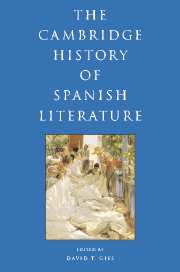Book contents
- Frontmatter
- I INTRODUCTION
- The Funes effect: making literary history
- II HISTORY AND CANONICITY
- III THE MEDIEVAL PERIOD
- IV EARLY MODERN SPAIN: RENAISSANCE AND BAROQUE
- V THE ENLIGHTENMENT AND NEOCLASSICISM
- VI THE FORGING OF A NATION: THE NINETEENTH CENTURY
- VII THE MODERN, MODERNISMO, AND THE TURN OF THE CENTURY
- VIII TWENTIETH-CENTURY SPAIN AND THE CIVIL WAR
- IX IN AND OUT OF FRANCO SPAIN
- X POST-FRANCO SPANISH LITERATURE AND FILM
- Bibliography
- Index
The Funes effect: making literary history
from I - INTRODUCTION
Published online by Cambridge University Press: 28 March 2008
- Frontmatter
- I INTRODUCTION
- The Funes effect: making literary history
- II HISTORY AND CANONICITY
- III THE MEDIEVAL PERIOD
- IV EARLY MODERN SPAIN: RENAISSANCE AND BAROQUE
- V THE ENLIGHTENMENT AND NEOCLASSICISM
- VI THE FORGING OF A NATION: THE NINETEENTH CENTURY
- VII THE MODERN, MODERNISMO, AND THE TURN OF THE CENTURY
- VIII TWENTIETH-CENTURY SPAIN AND THE CIVIL WAR
- IX IN AND OUT OF FRANCO SPAIN
- X POST-FRANCO SPANISH LITERATURE AND FILM
- Bibliography
- Index
Summary
One fears that Pierre Menard might have had it right when he proclaimed, “There is no intellectual exercise which is not ultimately useless.” Certainly, the thorny problem of writing literary history might fit into Menard’s category and he might have despaired at, if not the ultimate uselessness of the task, at least its seeming impossibility. Moreover, if Menard despaired, then his colleague (and presumed soulmate) Funes, whose implacable memory prohibited him from making connections (indeed, from thinking), merely went crazy in his attempt to sort out his own reality and reduce it to comprehensible units. As the narrator of his story reveals, “I suspect, nevertheless, that he was not very capable of thought. To think is to forget a difference, to generalize, to abstract. In the overly replete world of Funes there were nothing but details, almost contiguous details.” If Menard was not up to the challenge of reliving every crucial moment in the life of the author of Don Quijot in order to replicate not only the end product, but the experiences which informed that text, and Funes could forget nothing, and hence, not think, what, then, is to become of the modern literary historian, who faces similar challenges? How is the historian of literature to “think” when crushed by an avalanche of details (dates, categories, names, works, “-isms,” movements, languages, boundaries, nationalities)? To write literary history – to rewrite literary history – must we relive literary history? Is this what Mario Valdés has in mind when he states, “every writing of literary history is inadequate to the task of reenactment, but nevertheless is a necessity for the cultural identity of the society that produces the writing”? “Inadequate … necessity” – do the terms cancel each other out? Like Funes, are we doomed if we do, doomed if we don’t?
- Type
- Chapter
- Information
- The Cambridge History of Spanish Literature , pp. 1 - 12Publisher: Cambridge University PressPrint publication year: 2005
- 1
- Cited by

